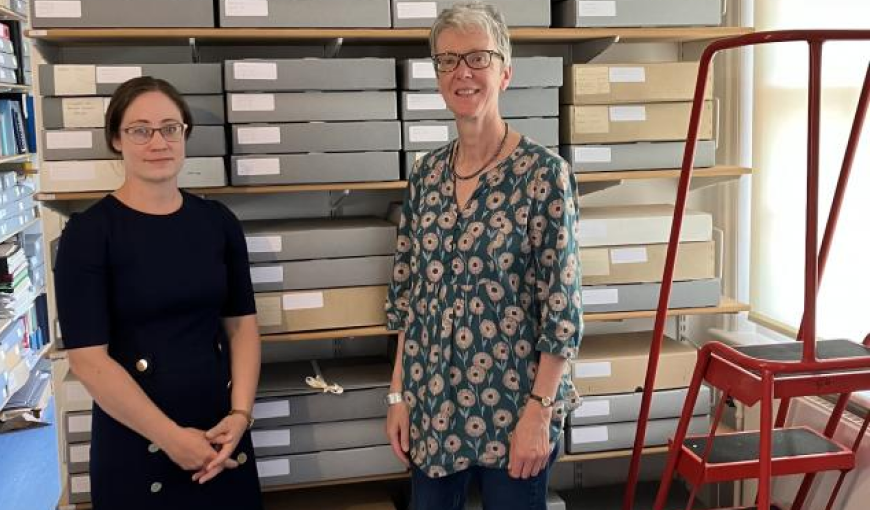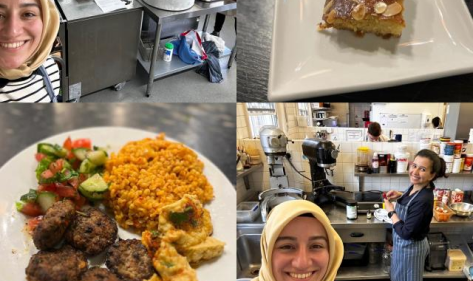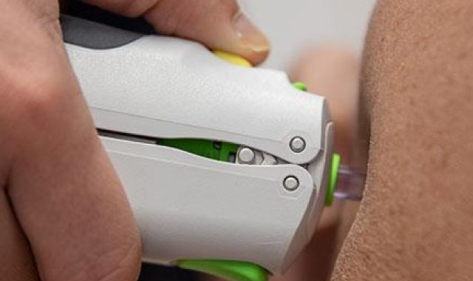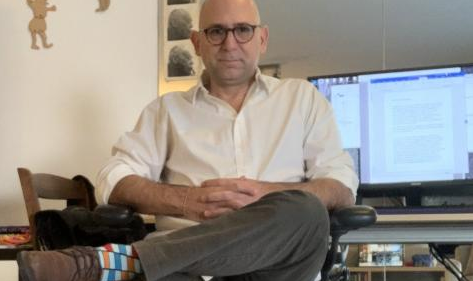
Up several flights of steep stairs above the College kitchens, along a narrow corridor so low that Jacky Cox has to duck to avoid bumping her head on the ceiling, is the Darwin College archive. Discreet and unlikely, its current home adds to the sense that you ought to sign the official secrets act before you’re allowed in.
But, under redevelopment plans for the Hermitage, the archives are likely to be moved, potentially to a space which has been identified within the Study Centre. As a result, they will be more visible, and those who work with them less cloistered. But preparing for a move means that it’s essential to know what the archive currently contains. It is partially this preparation which enabled Jacky, College Archivist and Keeper of the University Archives, to make the case for a six month full-time assistant’s role, held by Sally Loesch.
“If the archives are to be moved, you’ve got to have confidence that they’re to be moved safely,” says Jacky. “There was quite a lot of material that had accumulated during the pandemic over which we didn’t have any control. One of Sally’s major jobs, that she’s done fantastic things with in the last six weeks, is getting some physical and intellectual control over the material that was loose and hadn’t been processed. If you look around these shelves, the boxes with yellow stickers on are boxes where we have a catalogue description of this material, and it’s in a box. So you could, if push came to shove and you had to move the archive tomorrow, pick up a box and know what would be in it.
“But there was a significant proportion of material for which I couldn’t find any description online at all, and it was loose. So that was the worst of all worlds, because you can’t be carrying single folders down a staircase, and if you don’t know what you’re taking out of this room, how on earth will you know what you’re going to receive at the other end?”
Darwin has employed a College Archivist since 1967. The early Fellows recognised the importance of the College’s records as the raw material of corporate memory. In 2023, after more than half a century of collecting, the institutional archives are a wide-ranging and rich reflection of College activity since its foundation, with records for every period.
Jacky joined Darwin as a Bye-Fellow during the pandemic and was elected Fellow Archivist in July 2022, in addition to her existing role at the University Library, where she has worked since 2000. Owing to her University commitments, her remit at Darwin is essentially advisory, and that advice, this year, included the need for an Assistant Archivist.
Preparing the archives to be moved was one of three aspects to Sally’s appointment. Another is to complete a scoping study of the recordings of the Darwin College lectures, both single events and renowned annual series, which exist in a range of formats dating back over four decades. Understanding what recordings there are, and in what medium, is a necessary prelude to digitising the recordings to enable them to be preserved and accessed long-term. In addition to this, her role also includes identifying what is worthy of permanent preservation among inherited digital materials.
“All of this is really about getting on top of risk,” says Jacky. “Obviously it’s ultimately about facilitating research, but to do that you first have to address threats to survival, such as ignorance of what you have and where it is or format redundancy or digital frailty.”
Sally, who will complete her Masters in Library Science at San Jose State University later this year, recently moved to Cambridge from Baltimore to accompany her geneticist husband. She had previously worked at Baltimore’s public library, The Enoch Pratt Free Library, where among other responsibilities she had prepared for a collection to be moved.
“The most applicable experience to this was, we had a big collection, the building was being renovated, and there were tens of thousands of volumes in the social sciences and history department that I worked in that needed to be moved. So that was one of the things that made me say ‘oh! I can do this!’ because I know what it means to prepare for a big move.”
Institutional archives continue to grow, and as Darwin’s production of administrative records shows no signs of slowing down, there will continue to be a need for someone to manage the flow and decide what is worthy of preservation. A recent decision to accept offers of personal archives from those with a connection to the College and its buildings means that the focus of the archive, which is currently 98% institutional, may shift somewhat. A recent acquisition of some of Margaret Keynes (née Darwin)’s personal papers, including correspondence and notes for her book A House by the River has been keeping Sally busy.
“I did spend a whole morning on these. Normally I try to just get through, to just get things described and put on a shelf, but those I really can look at for a long time.”



